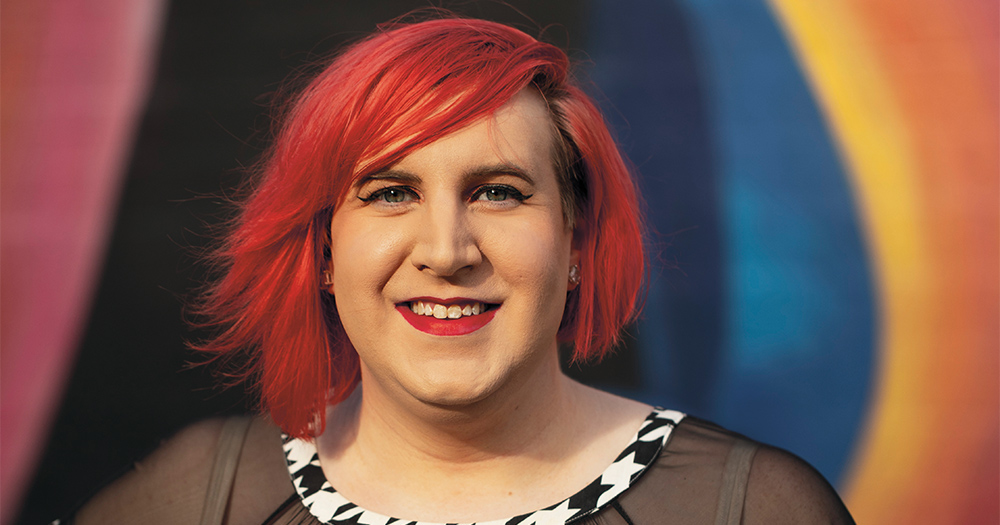When Éirénne Carroll first found out she would be the new CEO of TENI (Transgender Equality Network Ireland), it was 5:00 AM in the morning. She was living in North Carolina, and when the +353 prefix popped up on her screen, she knew Ireland was calling, and with it, news of her new position. Needless to say, Éirénne was delighted: “I smartly put myself on mute as I jumped up and down and yelled in my apartment! It was extremely exciting to get the chance to come and be a part of the team. TENI has such a track record of advocacy that it’s hard not to fall in love with the organisation.”
Before making the move to Ireland, Éirénne had worked extensively in the nonprofit sector in India, Nepal and the US. This experience offered her some valuable insights into the role adaptability plays in becoming the CEO for TENI: “There is no one-size-fits-all approach to advocacy. I don’t ever see myself as someone who can come in and know all the answers. I’m definitely someone that likes to learn about situations, to get to know the ground level community and what their needs are, and build resources to address those needs, rather than a top-down programmatic structure.”
It was the tenacious track-record of TENI that first attracted Éirénne to the CEO role: “Over the last 10 years, TENI has advocated and worked for such monumental change. TENI was fundamental to the Marriage Equality Act, and to getting the Gender Recognition Act passed, which is phenomenal. Seeing the impact this has had on just allowing trans people to come out and be recognised for who they are is amazing. TENI continues to do really great work. From the healthcare and medical professional training to the school training to the corporate training, it continues to push forward on better equality and better inclusion every single day. It’s great to be a part of that.”

Having said that, Éirénne acknowledges that there is still work to be done: “Ireland is already on the cusp of being a progressive leader in trans rights and equality, which is a great foundation to have. However, there are more steps we can take. Addressing transgender health and education is fundamental. We’d love for the Gender Recognition Act to recognise our non-binary and intersex friends and family members. We also need to advocate for the protection of trans children in schools. It’s important to address some of the employment challenges and stigmas that trans people can run into when applying for jobs as well. We want to make sure that employers are educated enough to understand how to support their trans employees, and what it means to be diverse and inclusive in their recruitment strategy.”
Stigma remains an obstacle that prevents many trans, non-binary and intersex people from living a prejudice-free life. In terms of tackling this stigma, Éirénne maintains that it’s vital to educate the general public on the prevalence of trans people in Irish society: “If we are to continue to move Ireland forward, there are cultural stigmas that need to be addressed. The next step is to build a culture of inclusion, rather than just a culture of acceptance. Advocacy is not simply about building and improving legislation, it’s about doing enough education work that people will really understand that they’ve always known trans people. They’ve always interacted with trans people. We’re their neighbours, their family members, and we’re just here trying to live a normal life. Once we start building those roadblocks, and showing how ‘normal’ it is to be trans, that’s when people start having their minds changed, and that’s what makes the community more accepting.”
Another of TENI’s aims is to establish a culture in Ireland where trans, intersex and non-binary people are not just included and accepted, but celebrated: “We’re creating opportunities for trans people to be celebrated for who they are, the work they’ve done, the things they enjoy, and their hobbies. Our lives don’t just revolve around our gender identity. One of the negative perceptions of the trans community is that we are just focused on our gender identity. This is false. Trans people have hobbies and they have a life. They do amazing work. We want to be able to showcase that work and celebrate the resilience of our community.”
One of Éirénne’s first challenges in becoming CEO of TENI was helping the organisation adapt to work around a global pandemic: “COVID-19 has really impacted the work of our support groups and our training. TENI has always been an organisation that likes to meet with people to do trainings in person, to have peer support groups in person, and to use our office as a place where the community comes together. So having to figure out how to take all of our programmes and move them online rapidly was definitely a big challenge.”
Undeniably, life in lockdown has been particularly challenging for the trans, non-binary and intersex community at large. “We know that some of our community members are in unsafe and insecure housing environments where they’re not able to be out. They’re fighting with the additional pressure of having to live a life where their identity is being scrutinised.”

Her advice to those who feel unable to embrace the fullness of themselves in lockdown is pertinent: “For those in our community who are isolated, try and see if there are even small ways to celebrate who you are.” Éirénne recalls her own experience with feeling unable to be out: “I think about the things that affirmed me without putting me at risk. It was little things like listening to music that maybe wasn’t what I was ‘supposed’ to be listening to according to my perceived gender identity. So put on a playlist that you can enjoy and vibe to for a little bit. There are books, comic books and TV shows that have good queer representation that can give you an outlet to celebrate the community. Even if you can find little ways on your own to just affirm who you are in the midst of it all, it can really help.”
Éirénne reminds me that help and support are available to members of the community, even throughout lockdown: “TENI is always here if you need someone to talk to. You can send us a message or give us a call, we’ll be able to give you a call back and be there for you as well.”
Moreover, it is also vital for cisgender people to support our trans and gender-diverse siblings throughout lockdown and beyond. “We are glad to see that there are allies, to see that there are people that can educate themselves on our behalf,” Éirénne explains. “It is nice to know that you’re in a battle where the whole weight of it is not solely on your shoulders.” Discussing the unfortunate and hurtful rise in TERF rhetoric, Éirénne emphasises the difference allyship can make in protecting trans people from online abuse: “There are a growing number of fringe people who are aiming to smear trans rights online, especially on Twitter. So continue to use your voice and make it known that you are an ally. Something as simple as reporting accounts, reporting tweets and sharing affirming knowledge about the subject can go a long way. It’s just nice in a wave of angry voices to see an ally share a voice of support.”
This interview originally appeared in GCN Issue 365. Available to read online here.
This Thursday, GCN will host Talking Sense – a special information evening for journalists and other media workers addressing the legislative and healthcare backdrop to trans lives in Ireland, best practice when reporting on or discussing trans people and the issues unique to trans people, and how contemporary discourse was formed and cascaded. Speaking at the event will be Lisa Connell, Managing Editor of GCN, Éirénne Carroll, CEO of TENI, and journalist and author Una Mullaly.
© 2021 GCN (Gay Community News). All rights reserved.
Support GCN
GCN is a free, vital resource for Ireland’s LGBTQ+ community since 1988.
GCN is a trading name of National LGBT Federation CLG, a registered charity - Charity Number: 20034580.
GCN relies on the generous support of the community and allies to sustain the crucial work that we do. Producing GCN is costly, and, in an industry which has been hugely impacted by rising costs, we need your support to help sustain and grow this vital resource.
Supporting GCN for as little as €1.99 per month will help us continue our work as Ireland’s free, independent LGBTQ+ media.
